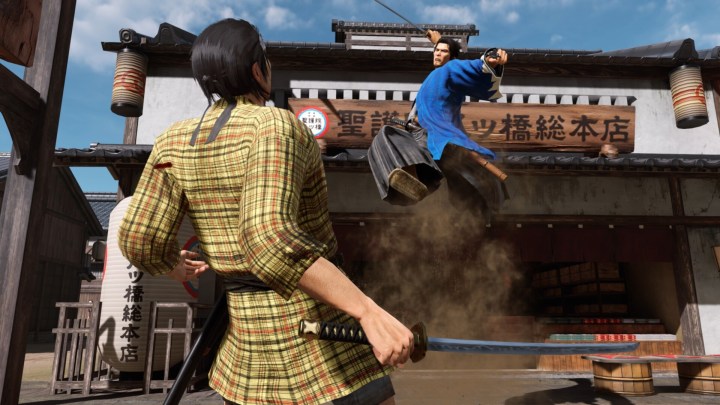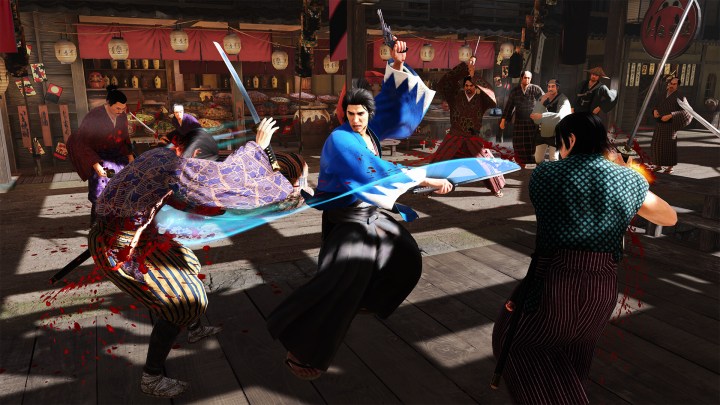The Yakuza name may be no more, but that doesn’t mean that the RPG series is going away anytime soon. Now rebranded as Like a Dragon, developer Ryu Ga Gotoku Studio seems more eager than ever to pump out entries in its ever-expanding universe — to the point of nearly annualizing it. This year will be no different, as February 21 will see the release of Like a Dragon: Ishin! on PC, PlayStation 4, PS5, Xbox One, and Xbox Series X/S.
Formerly a Japan-exclusive PS4 launch title, Ishin takes the basic ideas of the mainline Yakuza series and puts them in the context of a samurai action-adventure game set in the 1800s. The upcoming remake will bring it to the West for the first time ever — and that timing couldn’t be better. As the core series experiments with turn-based gameplay, Ishin is very firmly a return to the classic beat ’em up combat that longtime fans are used to. That makes it a sort of transitional game for those who aren’t quite ready for change.
I got a chance to play the remake’s third chapter, which included two hours of missions and open-world exploration. That slice already has me thankful that Ryu Ga Gotoku finally decided to bring the side-game to the U.S. It’s everything I love about Yakuza, placed into a fresh setting and filled with hysterical sub-stories that already have me in stitches.
New and old
Despite never having played the original Ishin, I immediately know what to do when my demo begins. I find myself controlling Sakamoto Ryōma, a samurai armed with a sword and flintlock pistol. Though the setting may be a far cry from the city streets of the main games, instead placing me in a quaint Japanese village, all my Yakuza instincts hold up. I start exploring the streets, hunting for side missions, seeking out minigames, and getting into fights with wandering bandits.

The biggest change comes from its combat, which trades in fists for swords and pistols, but even that change is somewhat cosmetic. Battles still work the same way as previous games where bumping into enemies will trigger a real-time fight. I have four stances I can switch between, like previous entries, and there’s a heat meter that allows me to pull off over-the-top finishing moves. In one encounter on a rickety bridge, I press Y to grab one of my enemies and toss them into the stream below.
The basics of battle are still the same, but fighting with a sword and pistol does still feel different, even if it’s just psychological. Sword swinging feels a bit more satisfying than punching at times, as I can gracefully cut down my enemies. Blocking is easier to wrap my head around too, as watching steel swords clash feels more impactful than absorbing punches.
The pistol makes for a strong gameplay tweak too, as it allows me to back off during tough fights and play it safe. The first samurai boss I encountered wiped the floor with me several times before I embraced my ranged stance and put several shots into him from afar. Dishonorable? Maybe, but it got the job done. The best stance utilizes both weapons, letting me fight with a more fast and fluid style that mixes close and long-range attacks. Those tools make for some wild heat attacks too, as I get to watch Ryōma plunge his sword straight through a bandit’s chest and hit them with a pistol blast to add insult to injury.

The combat system has s few quirks, which is one of the few areas where I can perhaps feel that this is a remake of a slightly older game. Switching feels a bit slow and a lack of true lock-on can make it difficult to keep track of enemies in tense boss fights. The reworked visuals are enough to get the job done, but it’s still clear that this is an older game with a good makeup job. Nitpicks aside, the remake feels on par with the Yakuza Kiwami games, which still hold up despite being half-a-decade old. Ishin isn’t going to feel like a new game, but its welcome change of scenery is more than enough to make up for it.
Global fraud
While I enjoy the combat in Yakuza games, I ultimately come to them for the story. I’ve grown to love Ryu Ga Gotoku’s writing, as it creates compelling crime stories that balance melodrama and slapstick perfectly. That tone holds true in Ishin, which already has me excited to see more of it. While its third chapter doesn’t give a sense of its wider narrative yet, I’m already intrigued by its focus on samurai politics and class struggles that spill out into the streets.

What I do have a full sense of, though, is its sub-stories. Side missions have always been a staple of the Yakuza series, bringing a level of sincere goofiness that breaks up some of its heavier moments. In my demo, I’d help a man figure out who ate his mochi, weed bad actors out of a group of dancing protestors, and run naked through the streets as I chase down a man who stole my clothing at a bathhouse (only to have to run back when authorities mistook me for a pervert flashing the streets for fun).
My favorite mission, however, had me laughing for a good five minutes. I stop to talk to an old man on the streets who begs for my help. He’s a teacher who’s been gifted a globe by some of his students’ parents, and now he’s expected to teach their kids about the world. The only problem? He doesn’t know what the hell a globe is. I have to help him out by posing as his assistant teacher and answering kids’ geography questions, covering for his bizarre white lie. In classic Yakuza fashion, that absurd premise builds to an oddly sincere conclusion as he confesses his fraud and earns his students’ respect. It’s the perfect encapsulation of what I love about the series in one hilarious setup.

There’s more of that reliable charm as I explore the open world. One minute, I’m chopping wood for an old man, the next I’m in the middle of a dancing minigame where Ryōma waves a fan around as I do some classic button-matching. There’s plenty I didn’t see as well, like its infamous brothel minigame, which leaves me feeling like Ishin will do more than enough to fill the traditional Yakuza hole in my heart, even if it no longer bears the name.
I’d originally been a little hesitant about Like a Dragon: Ishin! — assuming that it might feel like a dated remake (something I struggled with in the recently rereleased Crisis Core). Those worries entirely melted away in two hours. Instead, I find myself thrilled by the prospect of another mainline Yakuza game that plays around with the basic template without losing any of its hallmarks. So long as there are globe frauds that need helping, I’ll be there to lend a hand.
Like a Dragon: Ishin! launches on February 21 for PC, PS4, PS5, Xbox One, and Xbox Series X/S.



